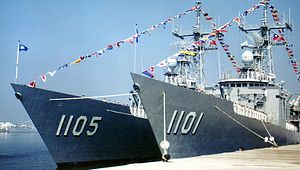On Friday, the U.S. House of Representatives passed its version of the FY 2016 National Defense Authorization Act (NDAA), which provides the U.S. military with funding. Buried in the text is an amendment that would make things awkward for the Pentagon: if mainland China is invited to the next installment of the RIMPAC exercises, the bill would compel the U.S. secretary of defense to extend an invitation to Taiwan as well.
The amendment, according to the House Committee on Rules, “requires that the Secretary of Defense invite military forces of Taiwan to participate in any maritime exercise (RIMPAC) if the Secretary has invited the military forces of People’s Republic of China to participate in such exercise.” The addition was proposed by Rep. Mark Walker (R-NC), who also proposed a number of other amendments (including an unsuccessful bid to ban the president from holding cyber security working groups with Russia and China until certifying that those countries “have ceased carrying out state-sponsored economic espionage in cyberspace against the U.S.”).
This isn’t the first time Congress has tried to finagle Taiwan an invite to the massive international naval exercises, which are held every two years off the coast of Honolulu. In 2013, Senator Dan Coats (R-IN) introduced an amendment to the FY 2014 NDAA expressing the Senate’s support for Taiwan to join RIMPAC.
In January 2014, Taiwan’s then-representative in the United States, King Pu-tsung, confirmed that Taiwan would seek to participate “in important U.S. military exercises, including the RIMPAC.” More recently, in April 2015, Taiwan’s deputy minister of national defense, Admiral Chen Yung-kang, told Taiwanese media that “we have expressed our willingness to take part in RIMPAC.” Chen noted that the U.S. and Taiwan are in talks on establishing a Code for Unplanned Encounters at Sea, a necessary prerequisite to taking part in multinational naval exercises.
A Ministry of National Defense spokesperson said Taiwan welcomed the NDAA amendment.
Beijing itself only participated in RIMPAC for the first time last year, and there’s already much debate over whether or not the PRC should be invited back. Not inviting mainland China to participate in the 2016 RIMPAC exercises would be one way to avoid triggering the need to invite Taiwan as well.
However, we may never see the RIMPAC amendment become law. The Senate will pass its own version of NDAA, which may not include the same language. Even if the provision about Taiwan and RIMPAC does survive, the entire bill itself faces a veto threat from President Barack Obama. Obama has derided the bill as using budgetary “gimmicks” rather than addressing spending caps placed on the military. This specific amendment may be scrapped as the bill is reworked to create a version that can pass through the House, Senate, and White House.
While Taiwan has never participated in RIMPAC, it will be sending representatives to the inaugural U.S. Pacific Command Amphibious Leaders Symposium (PALS) – to which Beijing was not invited.

































